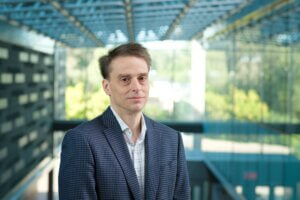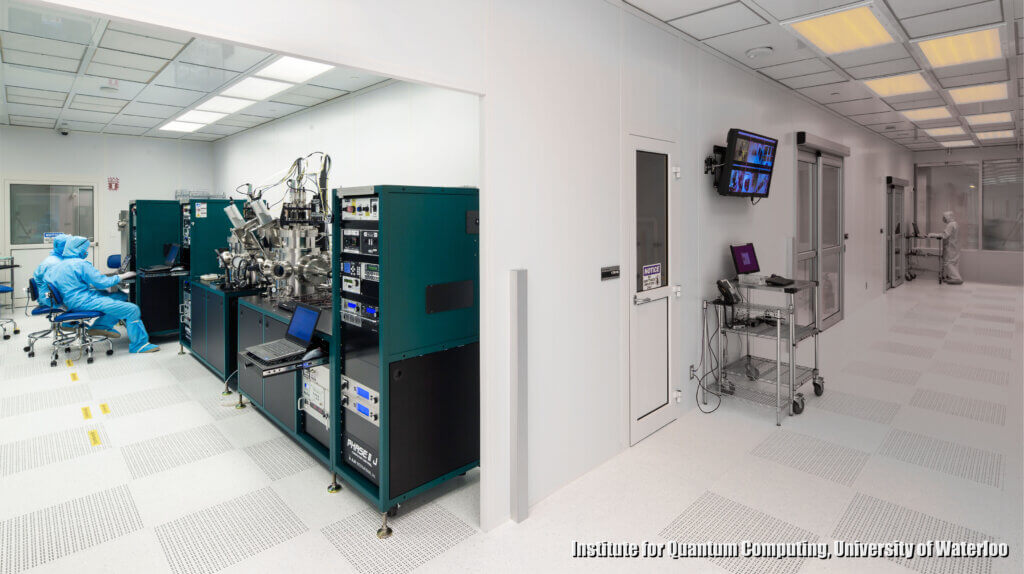How the Accelerator Centre is making a global impact in the R+T Park
This spring, two major showcase events brought Waterloo’s innovation community together to celebrate a new wave of startups tackling challenges…
Our location on the University of Waterloo campus has us surrounded by internationally recognized researchers and scientists in mechanical engineering, computer science, and quantum computing.
You’re not alone if the mention of quantum computing has your head spinning. Quantum computers appear to be real and something out of science fiction at the same time. But for all things quantum, being in two different states in one moment is part of what makes this field of study unique and potentially game-changing. In traditional computing, a bit is either a one or a zero, on or off. In quantum, the bit (or qubit) can be a one, a zero, or both simultaneously.
Physicist Paul Benioff first proposed the idea of a quantum computer in 1980. Since then, researchers have been working on not just how to build one but also working to identify what problems quantum computers can solve. Leading that effort to find the right problems is John Watrous, interim Executive Director for the University of Waterloo’s Institute for Quantum Computing (IQC).

When you speak with Watrous, you can quickly see his passion as a researcher and educator. “Everything seems complicated until you learn,” said Watrous. His interest in quantum information began in 1994 during his time at the University of Wisconsin. At this time, MIT professor Peter Shor made the discovery that led to what is known as Shor’s algorithm, a quantum algorithm for factoring exponentially faster than any traditional computer algorithm.
“That discovery really caused quantum computing to take off as a field of study,” said Watrous. “I pretty much dropped what I was doing and I started working on quantum information. It was really that one paper. I thought it was the coolest thing I’d ever seen.”
At the time, quantum information was still a nascent field, and there were no courses available on the subject. Watrous found that the field came naturally to him and jumped into work on his Ph.D. thesis on quantum information. “I wasn’t the first PhD student to write a thesis on quantum information, but I was one of the first generation of quantum thesis writers,” said Watrous.
Everything seems complicated until you learn
John Watrous
After earning his Ph.D. at the University of Wisconsin-Madison in 1998, Watrous completed a postdoctoral fellowship at the Université de Montréal and joined the University of Calgary as a faculty member. Watrous then joined IQC and the University of Waterloo’s School of Computer Science as a faculty member in 2006. Earlier this year, the University named Watrous as the Interim Executive Director, where he uses his wealth of research experience to guide IQC’s mission.
IQC researches the theoretical and experimental sides of quantum information and quantum computing. For the general public, quantum computers are presented as a way to test a solution against a seemingly infinite number of situations and variables in a short amount of time.
Watrous said that there are often bold claims about how quantum computers will allow us to efficiently solve difficult optimization problems. “People talk about these sorts of things and it’s important to realize that those are speculations about how quantum computers are going to be able to solve these different problems. One of the things that we really need to do as a community of researchers is to figure out exactly what we would use a quantum computer for,” Watrous added.

These are often the quantum computers of our dreams — general-purpose, large-scale quantum computers that replace the supercomputers we use today. “The truth of the matter is that we don’t really know exactly what they’re going to be good for,” added Watrous. “Trying to understand what we can use a quantum computer for — what they are really, truly going to be good for is important.”
Today, researchers know that quantum computers can be very good for tasks such as factoring integers as shown in Shor’s algorithm. Another task identified by researchers that poses the most near-term risk is the potential use to break today’s advanced cryptography. “Nobody wants to do that. If you do, you’re probably either a criminal, engaged in some sort of espionage, or maybe you’re a number theorist,” said Watrous. “But in terms of a real practical application, the jury’s still out on exactly what these machines are going to be good for.”
With Watrous as interim Executive Director, IQC continues to advance the study of quantum information and its potential uses in research and practical applications. “Quantum information is part of an emerging industry that we believe will have significant societal impact through quantum technologies,” said Watrous.

Thanks to the patronage of BlackBerry (RIM) co-founder Mike Lazaridis, IQC is the center of gravity in what many refer to as the Quantum Valley. IQC researchers are developing quantum technologies from initial idea through commercialization with the help of Quantum Valley Investments.
IQC has already spun off startups focused on quantum technologies, including Quantum Benchmark and evolutionQ. “About a third of our faculty members have startup companies or are involved in some significant way in a startup company,” added Watrous.
In addition to research and helping with commercialization, IQC also serves as a point of contact with government, industry, and other academic centres to advance quantum research in Canada such as the Quantum-Nano Fabrication and Characterization Facility (QNFCF) at the University of Waterloo. “It was started by IQC back in 2009 and it became an independent facility in 2018. That’s a fantastic resource for many users, including many that have no direct connection to quantum information at all,” said Watrous.
Beyond research and being an honest voice offering advice on quantum technologies, IQC is dedicated to educating and training the next generation of quantum workers and leaders.
Over its history, IQC has made significant contributions to this educational effort by training thousands of students at the high school, undergraduate, and graduate levels, as well as postdoctoral researchers working to advance the field across Canada and the world.
“Sometimes we speak about the quantum revolution and I think that’s a really powerful idea. But I think that we have to recognize that it hasn’t happened yet — and it can’t happen unless we have people that are going to make it happen.”
As the interest in quantum computers and their potential applications evolve, Watrous believes that IQC will continue to be the center of a thriving quantum ecosystem. “Success for IQC means impact — changing people’s lives and making the world a better place. This is not a movie where some kid is going to build a quantum computer in their basement. It’s got to be a collaborative effort that brings together all of these different players. IQC can’t succeed without our partners in the industry, government, and other academic partners succeeding as well.”